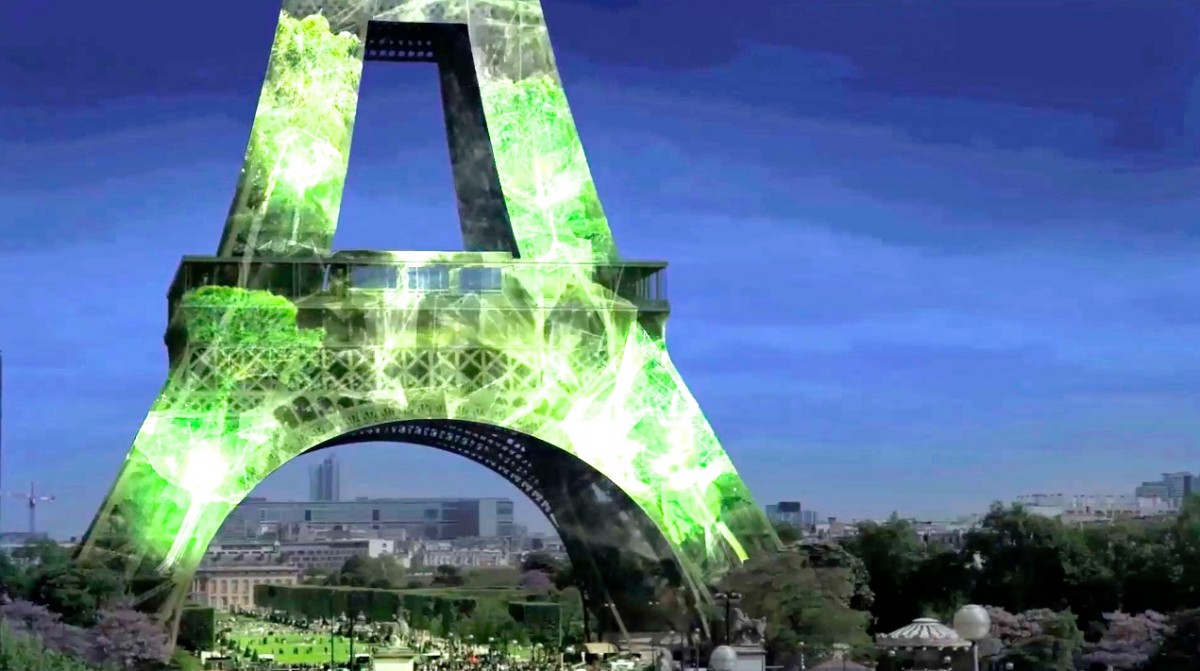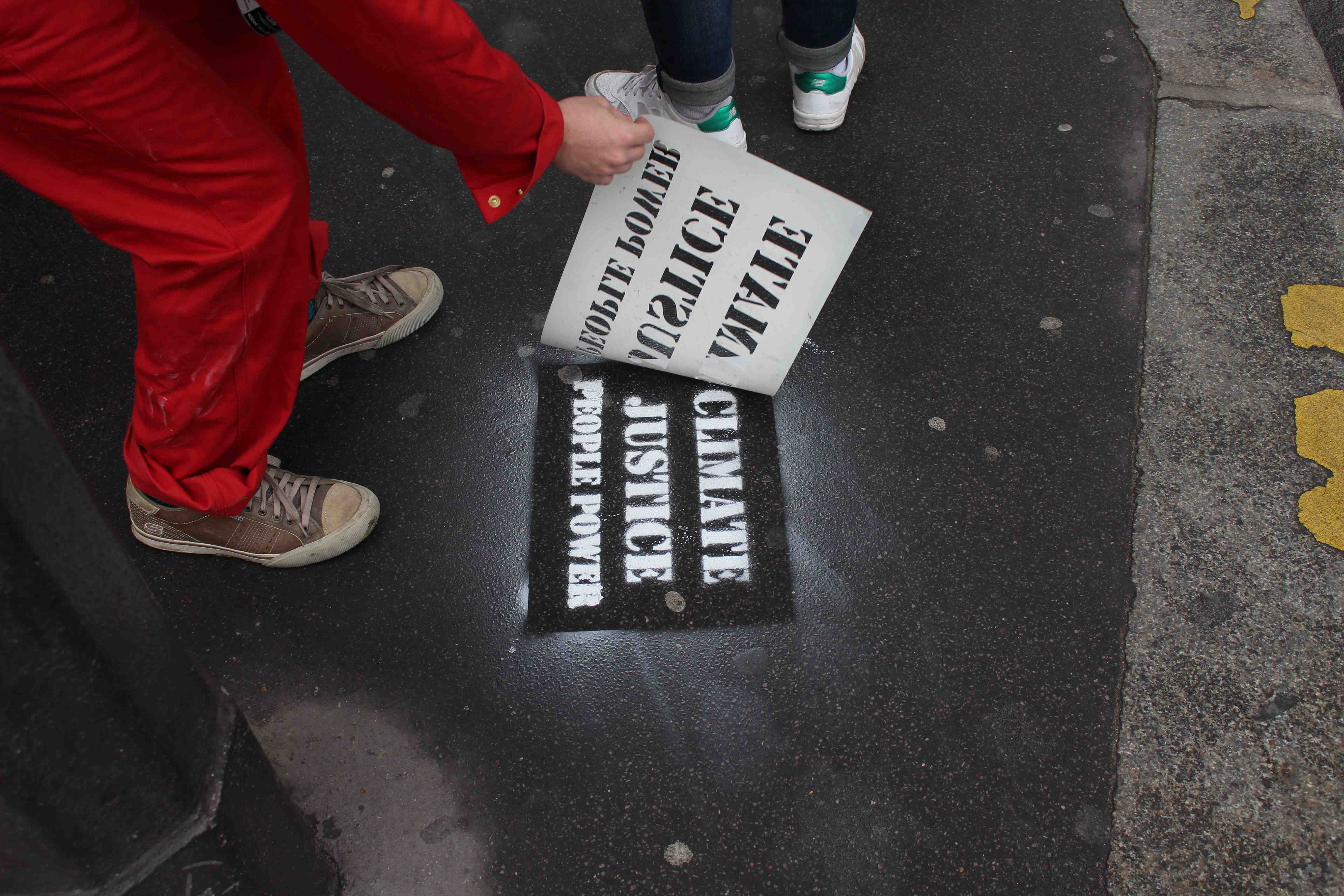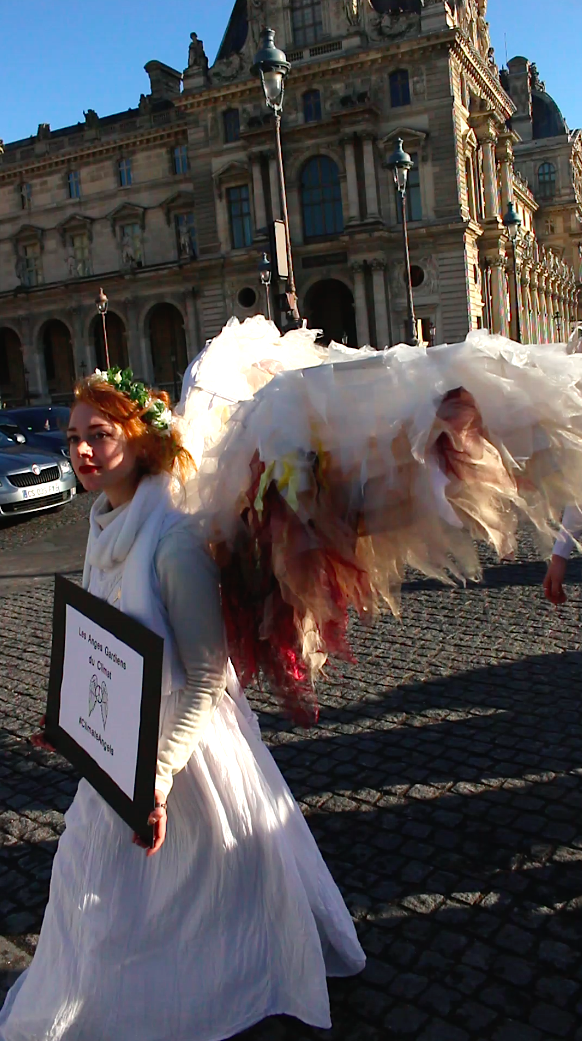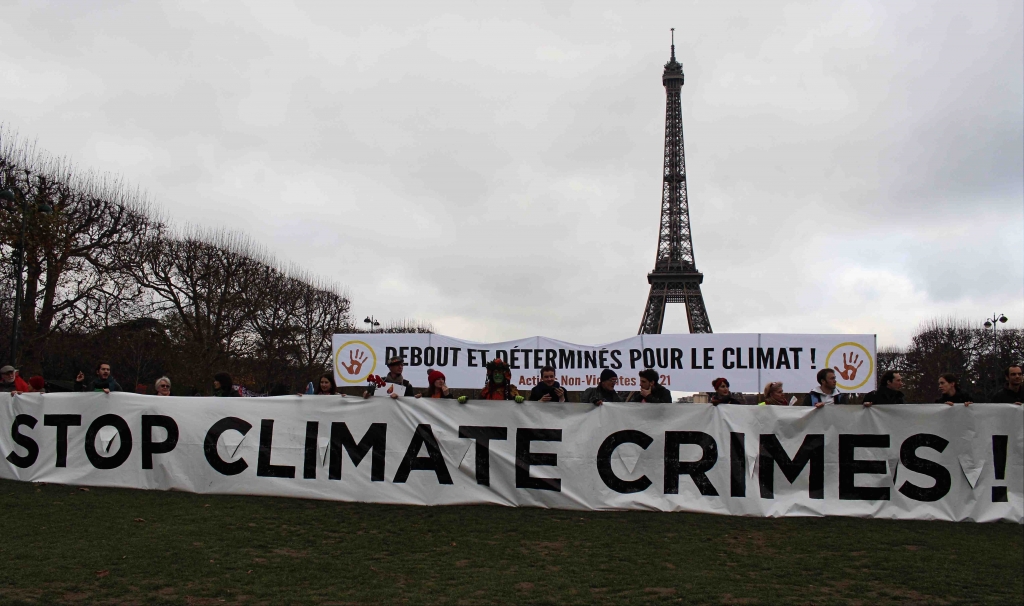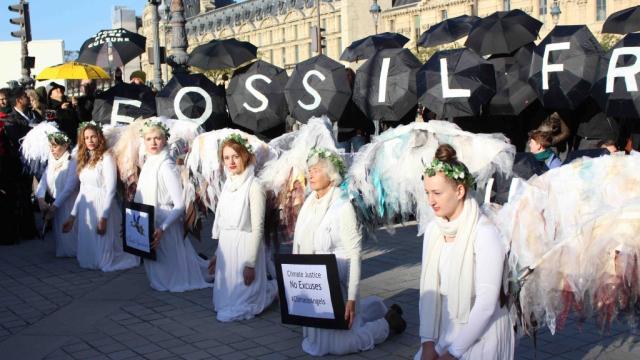
The big thing I took away from Paris is not political or scientific, not environmental or regulatory — but emotional and human. That thing is buoyant, positive anxiety. The kind of anxiety that gets things done. The flip side of the swirling, dark kind I brought to Paris and felt turn black the day before everything officially began. When environmental dissent brought tear gas and arrests, pessimism suffused the air, and all bets were off.
This time around, though, fate and willful intent prevailed. The climate change summit conference got up off its knees, then to its feet and ended with hands raised and loud cheering. The event will go down in history. It will be remembered as a turning point in the protracted, half-baked global efforts of 20-plus years to do something about climate change — first, by acting in unity and signing an agreement, and second by acknowledging that the problem at hand is of a magnitude, scale and seriousness never faced before by civilization.
Will the final agreement signed by 195 nations save our fattened asses, absolve our doddering leaders of their doddering, protect low-shoreline nations, or ensure Earth's human-centric future? Maybe. Not without wreckage and ruination along thousands of miles of ocean coast lines; not without parched river beds once wet with glacial runoff; not without species die off with unpredictable consequences; and probably not without Bible-waving congregations scaling hillsides and pleading with the leading character in their parable to tell them why He has not taken dominion over the Earth from the liberals who are wrecking it.
That said, though, Paris made me feel human and connected to people from around the world: to Kerri, the chatty member of the group sustainability team at Nedbank in South Africa. To Udayan, from Kathmandu, who assisted a speaker on climate-smart agriculture and publicly worried about his nation's cascade of crises: constitutional, environmental, and energy-related. To Michemiche, the dissident magician who entertained a table of grim protesters on the eve of their put-down. To Setta, from Dubai, who was curious about what I meant when I said the presentations about creative solutions were often uncreative powerpoint and talking head efforts more at home in the 1990s. To Stephanie at the U.S. Embassy who talked to me about orderly anarchists, to Chris the evangelist director with a focus on New Urbanism, and to Tegan the NPR reporter from Louisiana.
These and many others made my days and my nights in Paris. They felt like new friends met at a wedding. Our suspicions low, an immediate bonding became the default mode. We have similar values and shared visions of what might be. It all made for rich talk and heightened optimism. In our cynical, caustic world, to be in such rich human soil felt like sunshine in spring.
"The future belongs to those who give hope to the next generation." That was my favorite takeaway line, delivered by American environmentalist Hunter Lovings, in her cowboy hat, extolling the merits of organic soil, of natural capitalism, of a borrowed line she had taken from another environmentalist.
I also liked this delivery by one of the actors performing in "Soil, Society and Soil" at the opening of the Global Landscapes Forum in the Palais de Congress:
"Revolution! There is no time to lose!
I have a mission!
It will solve this crisis!
We will be 9 billion by 2050!
Our social welfare will be based on our environmental performance!"
And, of course, there was the main reason that 40,000 of us, including 110 or so heads of state and 3,000+ journalists, were here: for the negotiations to slow climate change, aiming to halt it with a maximum 2ºC rise in the proverbial nick of time and in the shadow of terror. One hundred and thirty mostly young people had been slaughtered by ISIS along the Rue de Voltaire and in nearby cafes on Nov. 13, the worst killings in France ever in peacetime.
The Negotiations Were Momentous Yet Inadequate
COP21 negotiators worked overnight as the clock ran down, sustaining the suspense for a world that seems unable to pay attention to anything that isn't a horse race. Tasked with the job of finalizing a deal that plots a carbon-reducing path into the future, the final agreement, as France's chief negotiator, Paul Watkinson, put it, had to be flexible enough to adapt to world changes and, most importantly, to "become stronger as time goes on."
Earth now has a show of unity and a document signed by 195 nations. There are goals, there are steps to reach the goals, there are issues galore, there is momentum. What else might you expect, really, when the problem at hand is of a magnitude never faced before by civilization?
Action, you say! All the nations say it's coming. They will have to be pushed. But Paris did its job. For all its shortcomings, the City of Light gave us hope.
As for civil society, it didn't fair so well in the celebrated agreement, whose careful language does not mention human rights or gender equality or the right of indigenous people to protect their ecosystems' survival. The Indigenous People’s Caucus, representing about 370 million people from territories that cover 20 percent of the planet's land, where 80 percent of the world's mix of plants and animals can be found, left Paris disappointed.
The Brewing Farming Revolution
The scale of this movement, in particular, surprised me. Farmers and their supporters packed forums, like one called Cool the Planet, Feed the World. They said they needed to take control of agriculture, get it out of the hands of industrial farming and business interests, and back under the control of producers themselves. Small producers, in particular, organized in large, productive farms that cooperate, distain chemicals, and, as Brazilian farmer Pedro Diniz said in his film, Life in Syntropy, "recognized nature as a great ally, a great inspiration." And added a younger farmer on screen: "Also be happy!"
Many were unhappy because small farmers everywhere continue to toil in the shadow of the greenhouse-gas emitting, bank-financed, subsidy-supported, tottering colossus of industrial agriculture. Regenerative agriculture is the answer, many speakers said, and voiced evidenced-based arguments in support of a farmers' revolt – both for healthier soil, and healthier food. Such soil is a carbon sink with global promise to remove vast amounts of CO2 from the atmosphere through natural processes rather than high-tech ones.
Gabe Brown, a rancher in North Dakota, touts the regenerative model in plain but soaring language in a documentary called Soil Carbon Cowboys. Brown says, "I think our whole world revolves around the carbon in the soil. It's the carbon molecules that feed soil life. And it's those micro organisms that feed all the plants that nourish all the animals that feed civilization."
Melting Arctic Lacks Attention
High on my list of disappointments with COP21 was how little attention the Arctic, Greenland in particular, commanded in Paris. My previous columns here and here on Occupy.com detail reason for global concern over Greenland's exploitation by the resource extraction industry. Beneath its icecap, the world's largest island has gold, ores, gems and earth metals like those found in tens of millions of gadgets. The place is being exploited; Denmark wants to let it drift completely free.
If Greenland's 200+ rivers and icebergs packed like corks in their mouths end up in the North Atlantic, a new nation will be exposed and oceans will have risen about 22 feet around the world. If that isn't cause for alarm, this is: Greenland's political maturity seems somewhere between kindergarten and second grade. Ideal for the front men of the mining industry to woe and wed in order to dig fast, before climate change stops their game.
There was a documentary in process about the plight of Greenland's Inuit hunters, the sea ice becoming ever less stable because of warming temperatures, but it got killed by the State of Emergency triggered by the killings of Nov. 13. The post-emergency footage I watched with a tiny audience highlighted the lack of focus on the Arctic, showing scenes of the Inuit hunters in full polar bear regalia hauling dogsleds through the streets of Paris, over bridges crossing the Seine, and past car-clogged, scooter-saturated, bike-busy streets like aliens.
My last two takeaways are political. First is the fragmented degree of America's participation. At least in Paris, America signed the agreement. And Obama showed up and made a good speech. But back home, Republican members of Congress ignored the conference like it had nothing to do with the future of the country that they want to control and steer back into the past, climate change a hoax and inequality the norm.
Lastly, I was impressed by the French. A nation in distress pulled defeat out of the fire. I want to give praise where praise is due. To the French leadership which, after fomenting violence in the Place de la Republique on Nov. 29, was wise enough to leave those alone who exercised liberte on Dec. 12, once the final agreement came out with great fanfare. A surprising leadership agility emerged from the Hollande government's handling of COP21. Oppression of dissidents was uncalled for, but there were no deaths, no outre violence in the mode of Nov. 13. The final agreement with 195 signatures, if not destined to change the horizon of the 21st century, at least recognized its threats and demanded collective will and action and progress in confronting carbon.
Forewarned is forearmed, as they say. France has forewarned the world. Now it's time to act on the agreement, ramp it up fast, and forge ahead.
3 WAYS TO SHOW YOUR SUPPORT
- Log in to post comments

